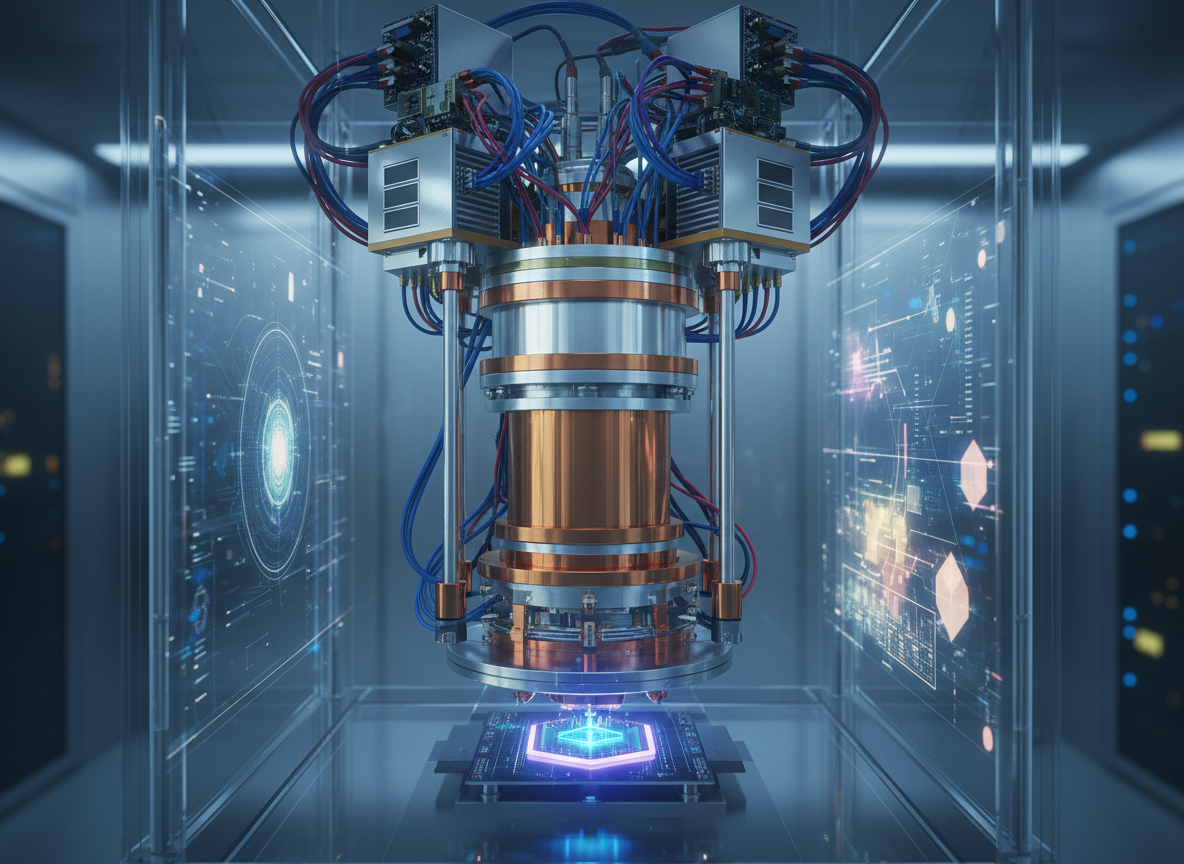Today's adversaries deploy hypersonic missiles that maneuver unpredictably at Mach 20, launch coordinated swarm attacks with hundreds of autonomous drones, and execute cyber-physical operations that blur the lines between digital and kinetic warfare. Static defense systems, no matter how sophisticated, are becoming obsolete against threats that evolve faster than traditional planning cycles can respond.
This is where quantum-accelerated simulation becomes an operational necessity for complex defense scenarios. Quantum technologies offer the computational edge needed to make sense of massive datasets, simulate dynamic threats in real-time, and guide fast, high-stakes decision-making.
The Strategic Importance of Quantum Advancements in Defence
Modern defense operations face overwhelming complexity from multi-domain coordination to dynamic threat adaptation. Classical systems can’t keep up, but quantum-accelerated simulation delivers the speed and scale today’s missions demand.
Why Quantum Matters in Defence Strategy:
- Faster Operational Planning: Quantum tools compress multi-variable simulations from hours to minutes, enabling faster battlefield decisions.
- Real-Time Threat Prediction: Adaptive algorithms forecast enemy behavior based on live data, improving anticipation and response.
- Trajectory and Resource Optimization: Optimize missile paths, drone swarm formations, and resource allocations simultaneously under constraints.
- Simulation of Complex Scenarios: Model battlefield outcomes across land, air, sea, space, and cyber domains in one cohesive environment.
- Decision Dominance Loop: Gain the upper hand by shortening the observe-orient-decide-act (OODA) loop using high-speed computation.
Quantum Computing and Cryptography in Defence Systems
Secure communication is the backbone of any defense operation whether it's coordinating troops or protecting intelligence data. But with the emergence of quantum computing, traditional cryptographic methods are at serious risk of being broken by brute-force decryption in the near future.
Challenges before Quantum:
- Classical encryption (like RSA) is vulnerable to Shor’s algorithm, which could break them once quantum hardware matures.
- Cyber threats are scaling in speed and complexity, outpacing conventional encryption key rotations.
- Retrofitting existing defense systems with post-quantum cryptography is costly and time-intensive.
How Quantum Computing Helps:
Quantum Key Distribution (QKD) creates unhackable encryption by using the laws of quantum physics.
Quantum Sensors: Enhancing Surveillance and Navigation
Quantum sensors leverage properties like superposition and entanglement to detect ultra-precise changes in gravity, magnetic fields, and acceleration making them invaluable for navigation, submarine tracking, and missile launch detection.
Challenges before Quantum:
- GPS-denied environments leave forces blind, especially in underground or underwater missions.
- Traditional sensors struggle in cluttered or contested environments (urban warfare, electronic jamming zones).
- Limited sensitivity makes early detection of stealth vehicles and subs extremely difficult.
How Quantum Sensors Help:
Quantum sensors provide precise navigation data without satellite dependency and enable earlier, more accurate threat detection in GPS-denied environments.BQPhy helps in designing quantum sensing materials.
Quantum Communication for Secure Military Networks
In a modern battlefield, data interception is a persistent threat jeopardizing everything from troop locations to missile targeting. Quantum communication secures these networks by making any eavesdropping attempt instantly detectable through quantum entanglement.
Challenges before Quantum:
- High risk of interception in traditional radio, satellite, and internet-based systems.
- Encryption methods rely on key exchanges vulnerable to man-in-the-middle attacks.
- Command-and-control structures are exposed during cyber-physical conflicts.
How Quantum Communication Helps:
Quantum entanglement ensures secure, tamper-evident communication channels. Global defense players are now building satellite-based quantum networks to protect their command structures. BQPhy’s quantum-aligned architecture is already designed to integrate with these networks ensuring scalability, survivability, and future-proofing for secure military operations.
Quantum Simulation for Weapons and Materials Testing
Weapons systems today must withstand hypersonic speeds, intense electromagnetic conditions, and real-time coordination across domains. Classical simulations struggle to replicate these conditions accurately or efficiently.
Challenges before Quantum:
- Classical physics models can’t scale to simulate the extreme environments modern weapons face.
- Limited ability to test rare failure modes due to data sparsity.
- High costs and time involved in physical prototyping and materials testing.
How Quantum Simulation Helps:
BQPhy's Quantum-Assisted Physics-Informed Neural Networks (QA-PINNs) embed real-world physics into machine learning models. This allows faster simulation of complex scenarios like missile trajectory prediction and electromagnetic interference. It reduces test cycles and accelerates R&D while improving accuracy even with minimal data.
Global Defence Initiatives and Investments in Quantum Tech
From the U.S. Department of Defense to China’s strategic roadmap and India’s National Quantum Mission, quantum defense has become a global arms race. Nations are investing billions to develop indigenous quantum capabilities for strategic autonomy.
BQPhy stands at the center of this movement, collaborating with the U.S. Air Force Research Laboratory and leading defense contractors. With strategic partnerships spanning IBM, Intel, and top-tier defense institutes, the company’s quantum-accelerated defense simulation stack is already delivering real-world results.
Challenges and Limitations in Military-Grade Quantum Tech
Despite its promise, quantum technology faces significant challenges. Hardware limitations, error correction, environmental sensitivity, and the high cost of development are non-trivial barriers to deployment.
Moreover, the integration of quantum systems into classified environments demands robust security protocols and operational validation. This is why BQPhy prioritizes hybrid solutions delivering quantum-inspired performance gains today while preparing clients for native quantum systems tomorrow.
Future Outlook: Quantum Technology as a Defence Game-Changer
The algorithmic arms race is already underway. The next shield won’t be forged from advanced materials, it will be built from algorithms that think faster, adapt quicker, and simulate reality more accurately than any adversary can counter.
With quantum-accelerated simulation platforms like BQPhy, defense organizations gain a first-mover advantage in computational superiority. Pilot programs offer a low-risk path to validate performance gains and scale capabilities across mission areas.
The question is no longer if quantum technology will define future defense superiority—but who will wield it first.
Ready to see how quantum-accelerated simulation can give your defense strategy a decisive edge?
Book a demo and explore BQPhy’s real-world impact.
FAQs
Why is quantum technology critical for modern defense systems?
Quantum computing and simulation enable real-time threat prediction, faster mission planning, and secure communication—capabilities classical systems can’t match in today’s fast-evolving warfare landscape.
How does quantum computing improve military cybersecurity?
Quantum Key Distribution (QKD) creates virtually unbreakable encryption, ensuring secure communication even under advanced cyber-physical attacks.
What role do quantum sensors play in defense operations?
Quantum sensors offer ultra-precise navigation and detection, allowing accurate tracking in GPS-denied or electronically jammed environments.
How does BQPhy contribute to quantum defense innovation?
BQPhy develops quantum-accelerated simulation and sensing solutions that support trajectory optimization, materials testing, and secure military communication systems.
What challenges still exist in deploying quantum defense technology?
Hardware limitations, environmental sensitivity, and integration into secure systems remain key barriers, but hybrid quantum-classical solutions are bridging this gap today.


.jpg)

.png)
.png)



.svg)
.svg)
.svg)
.svg)